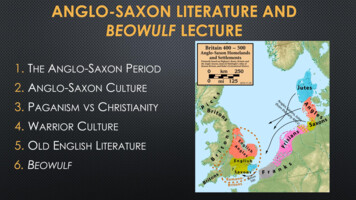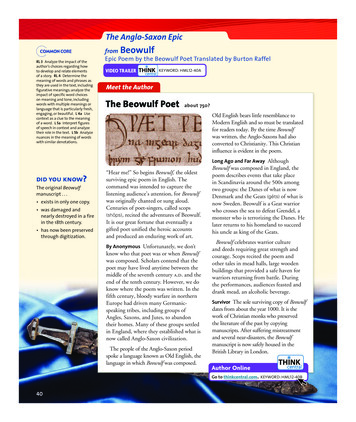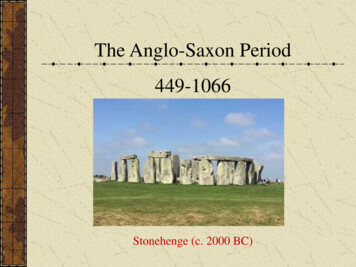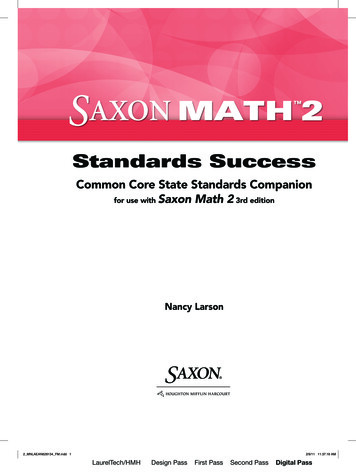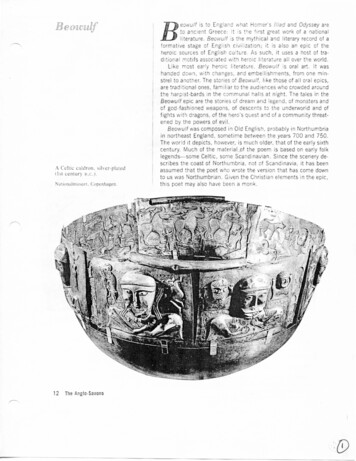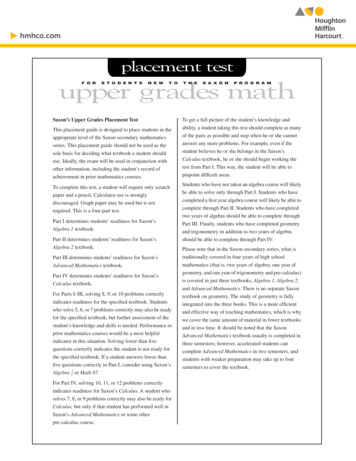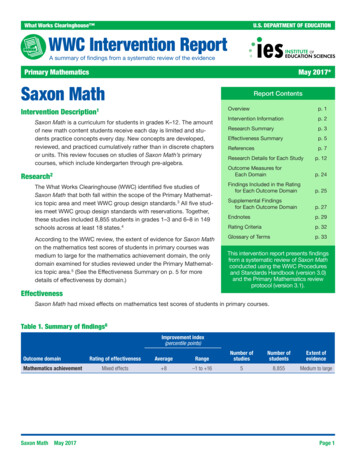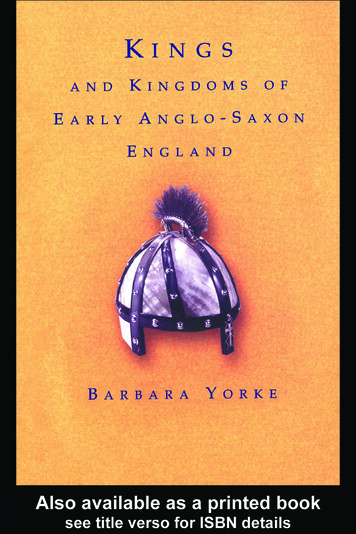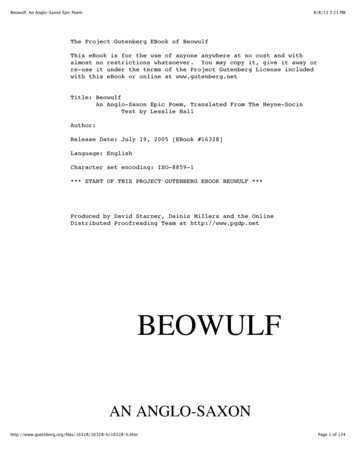
Transcription
Beowulf: An Anglo-Saxon Epic Poem8/8/13 3:21 PMThe Project Gutenberg EBook of BeowulfThis eBook is for the use of anyone anywhere at no cost and withalmost no restrictions whatsoever. You may copy it, give it away orre-use it under the terms of the Project Gutenberg License includedwith this eBook or online at www.gutenberg.netTitle: BeowulfAn Anglo-Saxon Epic Poem, Translated From The Heyne-SocinText by Lesslie HallAuthor:Release Date: July 19, 2005 [EBook #16328]Language: EnglishCharacter set encoding: ISO-8859-1*** START OF THIS PROJECT GUTENBERG EBOOK BEOWULF ***Produced by David Starner, Dainis Millers and the OnlineDistributed Proofreading Team at http://www.pgdp.netBEOWULFAN 328-h/16328-h.htmPage 1 of 134
Beowulf: An Anglo-Saxon Epic Poem8/8/13 3:21 PMEPIC POEMTRANSLATEDFROM THE HEYNE-SOCIN TEXTBYJNO: LESSLIE HALL, PH. D.(J.H.U.)PROFESSOR OF ENGLISH AND HISTORY IN THECOLLEGE OF WILLIAM AND MARYD.C. HEATH & CO., PUBLISHERSBOSTON NEW YORK h/16328-h.htmPage 2 of 134
Beowulf: An Anglo-Saxon Epic Poem8/8/13 3:21 PMEntered according to Act of Congress, in the year 1892, byJNO: LESSLIE HALL,in the Office of the Librarian of Congress, at 328-h/16328-h.htmPage 3 of 134
Beowulf: An Anglo-Saxon Epic Poem8/8/13 3:21 PMTOMy 6328-h.htmPage 4 of 134
Beowulf: An Anglo-Saxon Epic Poem8/8/13 3:21 PMCONTENTS.[v]PAGEPREFACEviiBIBLIOGRAPHY OF TRANSLATIONSxiGLOSSARY OF PROPER NAMESxiiiLIST OF WORDS AND PHRASES NOT IN GENERAL xviiiUSETHE LIFE AND DEATH OF SCYLD (I.)SCYLD’S SUCCESSORS (II.)13HROTHGAR’S GREAT MEAD-HALLGRENDEL, THE MURDERER (III.)5BEOWULF GOES TO HROTHGAR’S ASSISTANCE (IV.)8THE GEATS REACH HEOROT (V.)10BEOWULF INTRODUCES HIMSELF AT THE PALACE (VI.)12HROTHGAR AND BEOWULF (VII.)14HROTHGAR AND BEOWULF (CONTINUED) (VIII.) 17UNFERTH TAUNTS BEOWULF (IX.)19BEOWULF SILENCES UNFERTH (X.)GLEE IS HIGH21ALL SLEEP SAVE ONE (XI.)GRENDEL AND BEOWULF (XII.)GRENDEL IS VANQUISHED (XIII.)242628REJOICING OF THE DANES (XIV.)HROTHGAR’S GRATITUDE (XV.)3033HROTHGAR LAVISHES GIFTS UPON HIS DELIVERER 35(XVI.)BANQUET (CONTINUED) (XVII.)37THE SCOP’S SONG OF FINN AND HNÆFTHE FINN EPISODE (CONTINUED) (XVIII.)THE BANQUET CONTINUES39BEOWULF RECEIVES FURTHER HONOR (XIX.) 41THE MOTHER OF GRENDEL (XX.)44HROTHGAR’S ACCOUNT OF THE MONSTERS (XXI.)46BEOWULF SEEKS GRENDEL’S MOTHER (XXII.) 48BEOWULF’S FIGHT WITH GRENDEL’S MOTHER 28-h/16328-h.htmPage 5 of 134
Beowulf: An Anglo-Saxon Epic Poem[vi]8/8/13 3:21 PMBEOWULF IS DOUBLE-CONQUEROR (XXIV.)BEOWULF BRINGS HIS TROPHIES (XXV.)5357HROTHGAR’S GRATITUDEHROTHGAR MORALIZES (XXVI.)REST AFTER LABOR60SORROW AT PARTING (XXVII.)THE HOMEWARD JOURNEY (XXVIII.)6264THE TWO QUEENSBEOWULF AND HIGELAC (XXIX.)67BEOWULF NARRATES HIS ADVENTURES TO HIGELAC69 (XXX.)GIFT-GIVING IS MUTUAL (XXXI.)THE HOARD AND THE DRAGON (XXXII.)7375BRAVE THOUGH AGED (XXXIII.)REMINISCENCESBEOWULF SEEKS THE DRAGON (XXXIV.)78BEOWULF’S REMINISCENCESREMINISCENCES (CONTINUED) (XXXV.)8183BEOWULF’S LAST BATTLEWIGLAF THE TRUSTY (XXXVI.)88BEOWULF IS DESERTED BY FRIENDS AND BY SWORDTHE FATAL STRUGGLE (XXXVII.)BEOWULF’S LAST MOMENTS91WIGLAF PLUNDERS THE DRAGON’S DEN (XXXVIII.)93BEOWULF’S DEATHTHE DEAD FOES (XXXIX.)95WIGLAF’S BITTER TAUNTSTHE MESSENGER OF DEATH (XL.)97THE MESSENGER’S RETROSPECT (XLI.)WIGLAF’S SAD STORY (XLII.)THE HOARD CARRIED OFF99103THE BURNING OF BEOWULF s/16328/16328-h/16328-h.htmPage 6 of 134
Beowulf: An Anglo-Saxon Epic Poem8/8/13 3:21 PMPREFACE.[vii]THE present work is a modest effort to reproduce approximately, inmodern measures, the venerable epic, Beowulf. Approximately, Irepeat; for a very close reproduction of Anglo-Saxon verse would, to alarge extent, be prose to a modern ear.The Heyne-Socin text and glossary have been closely followed.Occasionally a deviation has been made, but always for what seemedgood and sufficient reason. The translator does not aim to be an editor.Once in a while, however, he has added a conjecture of his own to theemendations quoted from the criticisms of other students of the poem.This work is addressed to two classes of readers. From both of thesealike the translator begs sympathy and co-operation. The Anglo-Saxonscholar he hopes to please by adhering faithfully to the original. Thestudent of English literature he aims to interest by giving him, inmodern garb, the most ancient epic of our race. This is a bold andventuresome undertaking; and yet there must be some students of theTeutonic past willing to follow even a daring guide, if they may read inmodern phrases of the sorrows of Hrothgar, of the prowess of Beowulf,and of the feelings that stirred the hearts of our forefathers in theirprimeval homes.In order to please the larger class of readers, a regular cadence hasbeen used, a measure which, while retaining the essential characteristicsof the original, permits the reader to see ahead of him in reading.[viii]Perhaps every Anglo-Saxon scholar has his own theory as to howBeowulf should be translated. Some have given us prose versions ofwhat we believe to be a great poem. Is it any reflection on our honoredKemble and Arnold to say that their translations fail to show a laymanthat Beowulf is justly called our first epic? Of those translators whohave used verse, several have written from what would seem amistaken point of view. Is it proper, for instance, that the grave andsolemn speeches of Beowulf and Hrothgar be put in ballad measures,tripping lightly and airily along? Or, again, is it fitting that the roughmartial music of Anglo-Saxon verse be interpreted to us in the smoothmeasures of modern blank verse? Do we hear what has been beautifullycalled “the clanging tread of a warrior in mail”?Of all English translations of Beowulf, that of Professor Garnettalone gives any adequate idea of the chief characteristics of this greatTeutonic epic.The measure used in the present translation is believed to be as 6328-h.htmPage 7 of 134
Beowulf: An Anglo-Saxon Epic Poem8/8/13 3:21 PMa reproduction of the original as modern English affords. The cadencesclosely resemble those used by Browning in some of his most strikingpoems. The four stresses of the Anglo-Saxon verse are retained, and asmuch thesis and anacrusis is allowed as is consistent with a regularcadence. Alliteration has been used to a large extent; but it was thoughtthat modern ears would hardly tolerate it on every line. End-rhyme hasbeen used occasionally; internal rhyme, sporadically. Both have somewarrant in Anglo-Saxon poetry. (For end-rhyme, see 1 53, 1 54; forinternal rhyme, 2 21, 6 40.)What Gummere1 calls the “rime-giver” has been studiously kept;viz., the first accented syllable in the second half-verse always carriesthe alliteration; and the last accented syllable alliterates onlysporadically. Alternate alliteration is occasionally used as in theoriginal. (See 7 61, 8 5.)No two accented syllables have been brought together, exceptoccasionally after a cæsural pause. (See 2 19 and 12 1.) Or, scientificallyspeaking, Sievers’s C type has been avoided as not consonant with theplan of translation. Several of his types, however, constantly occur; e.g.A and a variant (/ x / x) (/ x x / x); B and a variant (x / x / ) (x x / x / ); a variant of D (/ x / x x); E (/ x x / ). Anacrusis gives furthervariety to the types used in the translation.The parallelisms of the original have been faithfully preserved.(E.g., 1 16 and 1 17: “Lord” and “Wielder of Glory”; 1 30, 1 31, 1 32;2 12 and 2 13; 2 27 and 2 28; 3 5 and 3 6.) Occasionally, some loss hasbeen sustained; but, on the other hand, a gain has here and there beenmade.[ix]The effort has been made to give a decided flavor of archaism to thetranslation. All words not in keeping with the spirit of the poem havebeen avoided. Again, though many archaic words have been used, thereare none, it is believed, which are not found in standard modern poetry.With these preliminary remarks, it will not be amiss to give anoutline of the story of the poem.THE STORY.Hrothgar, king of the Danes, or Scyldings, builds a great meadhall, or palace, in which he hopes to feast his liegemen and to givethem presents. The joy of king and retainers is, however, of shortduration. Grendel, the monster, is seized with hateful jealousy. Hecannot brook the sounds of joyance that reach him down in his fendwelling near the hall. Oft and anon he goes to the joyous building,bent on direful mischief. Thane after thane is ruthlessly carried off 328-h.htmPage 8 of 134
Beowulf: An Anglo-Saxon Epic Poem8/8/13 3:21 PMdevoured, while no one is found strong enough and bold enough tocope with the monster. For twelve years he persecutes Hrothgar andhis vassals.Over sea, a day’s voyage off, Beowulf, of the Geats, nephew ofHigelac, king of the Geats, hears of Grendel’s doings and ofHrothgar’s misery. He resolves to crush the fell monster and relieve theaged king. With fourteen chosen companions, he sets sail for Daneland. Reaching that country, he soon persuades Hrothgar of his abilityto help him. The hours that elapse before night are spent in beerdrinking and conversation. When Hrothgar’s bedtime comes he leavesthe hall in charge of Beowulf, telling him that never before has he givento another the absolute wardship of his palace. All retire to rest,Beowulf, as it were, sleeping upon his arms.Grendel comes, the great march-stepper, bearing God’s anger. Heseizes and kills one of the sleeping warriors. Then he advances towardsBeowulf. A fierce and desperate hand-to-hand struggle ensues. No armsare used, both combatants trusting to strength and hand-grip. Beowulftears Grendel’s shoulder from its socket, and the monster retreats to hisden, howling and yelling with agony and fury. The wound is fatal.The next morning, at early dawn, warriors in numbers flock to thehall Heorot, to hear the news. Joy is boundless. Glee runs high.Hrothgar and his retainers are lavish of gratitude and of gifts.[x]Grendel’s mother, however, comes the next night to avenge hisdeath. She is furious and raging. While Beowulf is sleeping in a roomsomewhat apart from the quarters of the other warriors, she seizes oneof Hrothgar’s favorite counsellors, and carries him off and devourshim. Beowulf is called. Determined to leave Heorot entirely purified, hearms himself, and goes down to look for the female monster. Aftertraveling through the waters many hours, he meets her near the seabottom. She drags him to her den. There he sees Grendel lying dead.After a desperate and almost fatal struggle with the woman, he slaysher, and swims upward in triumph, taking with him Grendel’s head.Joy is renewed at Heorot. Congratulations crowd upon the victor.Hrothgar literally pours treasures into the lap of Beowulf; and it isagreed among the vassals of the king that Beowulf will be their nextliegelord.Beowulf leaves Dane-land. Hrothgar weeps and laments at hisdeparture.When the hero arrives in his own land, Higelac treats him as adistinguished guest. He is the hero of the hour.Beowulf subsequently becomes king of his own people, the Geats.After he has been ruling for fifty years, his own neighborhood is wofullyharried by a fire-spewing dragon. Beowulf determines to kill him. In theensuing struggle both Beowulf and the dragon are slain. The grief 28-h.htmPage 9 of 134
Beowulf: An Anglo-Saxon Epic Poem8/8/13 3:21 PMthe Geats is inexpressible. They determine, however, to leave nothingundone to honor the memory of their lord. A great funeral-pyre is built,and his body is burnt. Then a memorial-barrow is made, visible from agreat distance, that sailors afar may be constantly reminded of theprowess of the national hero of Geatland.The poem closes with a glowing tribute to his bravery, hisgentleness, his goodness of heart, and his generosity.It is the devout desire of this translator to hasten the day when thestory of Beowulf shall be as familiar to English-speaking peoples asthat of the Iliad. Beowulf is our first great epic. It is an epitomizedhistory of the life of the Teutonic races. It brings vividly before us ourforefathers of pre-Alfredian eras, in their love of war, of sea, and ofadventure.My special thanks are due to Professors Francis A. March andJames A. Harrison, for advice, sympathy, and assistance.J.L. HALL.[1] Handbook of Poetics, page 175, 1st edition.[xi]ABBREVIATIONS USED IN THE NOTES.B. Bugge. C. Cosijn. Gr. Grein. Grdvtg. Grundtvig. H. Heyne. H. and S. Harrison and Sharp. H.-So. Heyne-Socin. K. Kemble. Kl. Kluge. M. Müllenhoff. R. Rieger. S. Sievers. Sw. Sweet. t.B. ten Brink. Th. Thorpe. W. Wülcker.BIBLIOGRAPHY OF TRANSLATIONS.Arnold, Thomas.—Beowulf. A heroic poem of the eighth century.London, 1876. With English translation. Prose.Botkine, L.—Beowulf. Epopée Anglo-Saxonne. Havre, 1877. FirstFrench translation. Passages occasionally omitted.Conybeare, J.J.—Illustrations of Anglo-Saxon Poetry. London,1826. Full Latin translation, and some passages translated into h/16328-h.htmPage 10 of 134
Beowulf: An Anglo-Saxon Epic Poem8/8/13 3:21 PMblank-verse.Ettmuller, L.—Beowulf, stabreimend übersetzt. Zürich, 1840.Garnett, J.M.—Beowulf: an Anglo-Saxon Poem, and the Fight atFinnsburg. Boston, 1882. An accurate line-for-line translation, usingalliteration occasionally, and sometimes assuming a metrical cadence.Grein, C.W.M.—Dichtungen der Angelsachsen, stabreimendübersetzt. 2 Bde. Göttingen, 1857-59.Grion, Giusto.—Beovulf, poema epico anglo-sassone del VII.secolo, tradotto e illustrato. Lucca, 1883. First Italian translation.Grundtvig, N.F.S.—Bjowulfs Drape. Copenhagen, 1820.Heyne, M.—A translation in iambic measures. Paderborn, 1863.Kemble, J.M.—The Anglo-Saxon Poems of Beowulf, theTraveller’s Song, and the Battle of Finnsburg. London, 1833. Thesecond edition contains a prose translation of Beowulf.Leo, H.—Ueber Beowulf. Halle, 1839. Translations of extracts.[xii]Lumsden, H.W.—Beowulf, translated into modern rhymes.London, 1881. Ballad measures. Passages occasionally omitted.Sandras, G.S.—De carminibus Cædmoni adjudicatis. Paris, 1859.An extract from Beowulf, with Latin translation.Schaldmose, F.—Beowulf og Scopes Widsith, to AngelsaxiskeDigte. Copenhagen, 1847.Simrock, K.—Beowulf. Uebersetzt und erläutert. Stuttgart undAugsburg, 1859. Alliterative measures.Thorkelin, G.J.—De Danorum rebus gestis secul. III. et IV. poemaDanicum dialecto Anglosaxonica. Havniæ, 1815. Latin translation.Thorpe, B.—The Anglo-Saxon Poems of Beowulf, the Scôp orGleeman’s Tale, and the Fight at Finnsburg. Oxford, 1855. Englishtranslation in short lines, generally containing two stresses.Wackerbarth, A.D.—Beowulf, translated into English verse.London, 1849.Wickberg, R.—Beowulf, en fornengelsk hjeltedikt, öfersatt.Westervik. First Swedish translation.von Wolzogen, H.—Beowulf, in alliterative measures. Leipzig.Zinsser, G.—Der Kampf Beowulfs mit Grendel. Jahresbericht ofthe Realschule at Forbach, 1881.[xiii]GLOSSARY OF PROPER /16328-h.htmPage 11 of 134
Beowulf: An Anglo-Saxon Epic Poem8/8/13 3:21 PM[The figures refer to the divisions of the poem in which the respectivenames occur. The large figures refer to fitts, the small, to linesin the fitts.]Ælfhere.—A kinsman of Wiglaf.—36 3.Æschere.—Confidential friend of King Hrothgar. Elder brother ofYrmenlaf. Killed by Grendel.—21 3; 30 89.Beanstan.—Father of Breca.—9 26.Beowulf.—Son of Scyld, the founder of the dynasty of Scyldings.Father of Healfdene, and grandfather of Hrothgar.—1 18; 2 1.Beowulf.—The hero of the poem. Sprung from the stock of Geats, sonof Ecgtheow. Brought up by his maternal grandfather Hrethel,and figuring in manhood as a devoted liegeman of his uncleHigelac. A hero from his youth. Has the strength of thirty men.Engages in a swimming-match with Breca. Goes to the help ofHrothgar against the monster Grendel. Vanquishes Grendel andhis mother. Afterwards becomes king of the Geats. Late in lifeattempts to kill a fire-spewing dragon, and is slain. Is buriedwith great honors. His memorial mound.—6 26; 7 2; 7 9; 9 3; 9 8;12 28; 12 43; 23 1, etc.Breca.—Beowulf’s opponent in the famous swimming-match.—9 8;9 19; 9 21; 9 22.Brondings.—A people ruled by Breca.—9 23.Brosinga mene.—A famous collar once owned by the Brosings.—19 7.Cain.—Progenitor of Grendel and other monsters.—2 56; 20 11.Dæghrefn.—A warrior of the Hugs, killed by Beowulf.—35 40.Danes.—Subjects of Scyld and his descendants, and hence often calledScyldings. Other names for them are Victory-Scyldings, HonorScyldings, Armor-Danes, Bright-Danes, East-Danes, WestDanes, North-Danes, South-Danes, Ingwins, Hrethmen.—1 1;2 1; 3 2; 5 14; 7 1, etc.Ecglaf.—Father of Unferth, who taunts Beowulf.—9 1.Ecgtheow.—Father of Beowulf, the hero of the poem. A widely-knownWægmunding warrior. Marries Hrethel’s daughter. Afterslaying Heatholaf, a Wylfing, he flees his country.—7 3; 5 6;8 4.Ecgwela.—A king of the Danes before Scyld.—25 60.[xiv]Elan.—Sister of Hrothgar, and probably wife of Ongentheow, king 28-h.htmPage 12 of 134
Beowulf: An Anglo-Saxon Epic Poem8/8/13 3:21 PMthe Swedes.—2 10.Eagle Cape.—A promontory in Geat-land, under which took placeBeowulf’s last encounter.—41 87.Eadgils.—Son of Ohthere and brother of Eanmund.—34 2.Eanmund.—Son of Ohthere and brother of Eadgils. The reference tothese brothers is vague, and variously understood. Heynesupposes as follows: Raising a revolt against their father, theyare obliged to leave Sweden. They go to the land of the Geats;with what intention, is not known, but probably to conquer andplunder. The Geatish king, Heardred, is slain by one of thebrothers, probably Eanmund.—36 10; 31 54 to 31 60; 33 66 to34 6.Eofor.—A Geatish hero who slays Ongentheow in war, and isrewarded by Hygelac with the hand of his only daughter.—41 18; 41 48.Eormenric.—A Gothic king, from whom Hama took away the famousBrosinga mene.—19 9.Eomær.—Son of Offa and Thrytho, king and queen of the Angles.—28 69.Finn.—King of the North-Frisians and the Jutes. Marries Hildeburg. Athis court takes place the horrible slaughter in which the Danishgeneral, Hnæf, fell. Later on, Finn himself is slain by Danishwarriors.—17 18; 17 30; 17 44; 18 4; 18 23.Fin-land.—The country to which Beowulf was driven by the currentsin his swimming-match.—10 22.Fitela.—Son and nephew of King Sigemund, whose praises are sung inXIV.—14 42; 14 53.Folcwalda.—Father of Finn.—17 38.Franks.—Introduced occasionally in referring to the death of Higelac.—19 19; 40 21; 40 24.Frisians.—A part of them are ruled by Finn. Some of them wereengaged in the struggle in which Higelac was slain.—17 20;17 42; 17 52; 40 21.Freaware.—Daughter of King Hrothgar. Married to Ingeld, aHeathobard prince.—29 60; 30 32.Froda.—King of the Heathobards, and father of Ingeld.—29 62.Garmund.—Father of Offa.—28 71.Geats, Geatmen.—The race to which the hero of the poem belongs.Also called Weder-Geats, or Weders, War-Geats, Sea-Geats.They are ruled by Hrethel, Hæthcyn, Higelac, and Beowulf.—4 7; 7 4; 10 45; 11 8; 27 14; 28 28-h.htmPage 13 of 134
Beowulf: An Anglo-Saxon Epic Poem8/8/13 3:21 PMGepids.—Named in connection with the Danes and Swedes.—35 34.Grendel.—A monster of the race of Cain. Dwells in the fens andmoors. Is furiously envious when he hears sounds of joy inHrothgar’s palace. Causes the king untold agony for years. Isfinally conquered by Beowulf, and dies of his wound. His handand arm are hung up in Hrothgar’s hall Heorot. His head is cutoff by Beowulf when he goes down to fight with Grendel’smother.—2 50; 3 1; 3 13; 8 19; 11 17; 12 2; 13 27; 15 3.Guthlaf.—A Dane of Hnæf’s party.—18 24.Half-Danes.—Branch of the Danes to which Hnæf belonged.—17 19.[xv]Halga.—Surnamed the Good. Younger brother of Hrothgar.—2 9.Hama.—Takes the Brosinga mene from Eormenric.—19 7.Hæreth.—Father of Higelac’s queen, Hygd.—28 39; 29 18.Hæthcyn.—Son of Hrethel and brother of Higelac. Kills his brotherHerebeald accidentally. Is slain at Ravenswood, fighting againstOngentheow.—34 43; 35 23; 40 32.Helmings.—The race to which Queen Wealhtheow belonged.—10 63.Heming.—A kinsman of Garmund, perhaps nephew.—28 54; 28 70.Hengest.—A Danish leader. Takes command on the fall of Hnæf.—17 33; 17 41.Herebeald.—Eldest son of Hrethel, the Geatish king, and brother ofHigelac. Killed by his younger brother Hæthcyn.—34 43; 34 47.Heremod.—A Danish king of a dynasty before the Scylding line. Wasa source of great sorrow to his people.—14 64; 25 59.Hereric.—Referred to as uncle of Heardred, but otherwise unknown.—31 60.Hetwars.—Another name for the Franks.—33 51.Healfdene.—Grandson of Scyld and father of Hrothgar. Ruled theDanes long and well.—2 5; 4 1; 8 14.Heardred.—Son of Higelac and Hygd, king and queen of the Geats.Succeeds his father, with Beowulf as regent. Is slain by the sonsof Ohthere.—31 56; 33 63; 33 75.Heathobards.—Race of Lombards, of which Froda is king. AfterFroda falls in battle with the Danes, Ingeld, his son, marriesHrothgar’s daughter, Freaware, in order to heal the feud.—30 1;30 6.Heatholaf.—A Wylfing warrior slain by Beowulf’s father.—8 5.Heathoremes.—The people on whose shores Breca is cast by thewaves during his contest with Beowulf.—9 328-h.htmPage 14 of 134
Beowulf: An Anglo-Saxon Epic Poem8/8/13 3:21 PMHeorogar.—Elder brother of Hrothgar, and surnamed ‘WeorodaRæswa,’ Prince of the Troopers.—2 9; 8 12.Hereward.—Son of the above.—31 17.Heort, Heorot.—The great mead-hall which King Hrothgar builds. It isinvaded by Grendel for twelve years. Finally cleansed byBeowulf, the Geat. It is called Heort on account of the hartantlers which decorate it.—2 25; 3 32; 3 52.Hildeburg.—Wife of Finn, daughter of Hoce, and related to Hnæf,—probably his sister.—17 21; 18 34.Hnæf.—Leader of a branch of the Danes called Half-Danes. Killed inthe struggle at Finn’s castle.—17 19; 17 61.Hondscio.—One of Beowulf’s companions. Killed by Grendel justbefore Beowulf grappled with that monster.—30 43.Hoce.—Father of Hildeburg and probably of Hnæf.—17 26.Hrethel.—King of the Geats, father of Higelac, and grandfather ofBeowulf.—7 4; 34 39.Hrethla.—Once used for Hrethel.—7 82.Hrethmen.—Another name for the Danes.—7 73.Hrethric.—Son of Hrothgar.—18 65; 27 19.[xvi]Hreosna-beorh.—A promontory in Geat-land, near which Ohthere’ssons made plundering raids.—35 18.Hrothgar.—The Danish king who built the hall Heort, but was longunable to enjoy it on account of Grendel’s persecutions. MarriesWealhtheow, a Helming lady. Has two sons and a daughter. Is atypical Teutonic king, lavish of gifts. A devoted liegelord, as hislamentations over slain liegemen prove. Also very appreciativeof kindness, as is shown by his loving gratitude to Beowulf.—2 9; 2 12; 4 1; 8 10; 15 1; etc., etc.Hrothmund.—Son of Hrothgar.—18 65.Hrothulf.—Probably a son of Halga, younger brother of Hrothgar.Certainly on terms of close intimacy in Hrothgar’s palace.—16 26; 18 57.Hrunting.—Unferth’s sword, lent to Beowulf.—22 71; 25 9.Hugs.—A race in alliance with the Franks and Frisians at the time ofHigelac’s fall.—35 41.Hun.—A Frisian warrior, probably general of the Hetwars. GivesHengest a beautiful sword.—18 19.Hunferth.—Sometimes used for Unferth.Hygelac, Higelac.—King of the Geats, uncle and liegelord of Beowulf,the hero of the poem.—His second wife is the lovely 16328-h.htmPage 15 of 134
Beowulf: An Anglo-Saxon Epic Poem8/8/13 3:21 PMdaughter of Hæreth. The son of their union is Heardred. Is slainin a war with the Hugs, Franks, and Frisians combined. Beowulfis regent, and afterwards king of the Geats.—4 6; 5 4; 28 34;29 9; 29 21; 31 56.Hygd.—Wife of Higelac, and daughter of Hæreth. There are someindications that she married Beowulf after she became a widow.—28 37.Ingeld.—Son of the Heathobard king, Froda. Marries Hrothgar’sdaughter, Freaware, in order to reconcile the two peoples.—29 62; 30 32.Ingwins.—Another name for the Danes.—16 52; 20 69.Jutes.—Name sometimes applied to Finn’s people.—17 22; 17 38;18 17.Lafing.—Name of a famous sword presented to Hengest by Hun.—18 19.Merewing.—A Frankish king, probably engaged in the war in whichHigelac was slain.—40 29.Nægling.—Beowulf’s sword.—36 76.Offa.—King of the Angles, and son of Garmund. Marries the terribleThrytho who is so strongly contrasted with Hygd.—28 59; 28 66.Ohthere.—Son of Ongentheow, king of the Swedes. He is father ofEanmund and Eadgils.—40 35; 40 39.Onela.—Brother of Ohthere.—36 15; 40 39.Ongentheow.—King of Sweden, of the Scylfing dynasty. Married,perhaps, Elan, daughter of Healfdene.—35 26; 41 16.Oslaf.—A Dane of Hnæf’s party.—18 24.Ravenswood.—The forest near which Hæthcyn was slain.—40 31;40 41.Scefing.—Applied (1 4) to Scyld, and meaning ‘son of Scef.’[xvii]Scyld.—Founder of the dynasty to which Hrothgar, his father, andgrandfather belonged. He dies, and his body is put on a vessel,and set adrift. He goes from Daneland just as he had come to it—in a bark.—1 4; 1 19; 1 27.Scyldings.—The descendants of Scyld. They are also called HonorScyldings, Victory-Scyldings, War-Scyldings, etc. (See‘Danes,’ above.)—2 1; 7 1; 8 1.Scylfings.—A Swedish royal line to which Wiglaf belonged.—36 2.Sigemund.—Son of Wæls, and uncle and father of Fitela. His strugglewith a dragon is related in connection with Beowulf’s deeds ofprowess.—14 38; 14 328-h.htmPage 16 of 134
Beowulf: An Anglo-Saxon Epic Poem8/8/13 3:21 PMSwerting.—Grandfather of Higelac, and father of Hrethel.—19 11.Swedes.—People of Sweden, ruled by the Scylfings.—35 13.Thrytho.—Wife of Offa, king of the Angles. Known for her fierce andunwomanly disposition. She is introduced as a contrast to thegentle Hygd, queen of Higelac.—28 42; 28 56.Unferth.—Son of Ecglaf, and seemingly a confidential courtier ofHrothgar. Taunts Beowulf for having taken part in theswimming-match. Lends Beowulf his sword when he goes tolook for Grendel’s mother. In the MS. sometimes writtenHunferth. 9 1; 18 41.Wæls.—Father of Sigemund.—14 60.Wægmunding.—A name occasionally applied to Wiglaf and Beowulf,and perhaps derived from a common ancestor, Wægmund.—36 6; 38 61.Weders.—Another name for Geats or Wedergeats.Wayland.—A fabulous smith mentioned in this poem and in other oldTeutonic literature.—7 83.Wendels.—The people of Wulfgar, Hrothgar’s messenger and retainer.(Perhaps Vandals.)—6 30.Wealhtheow.—Wife of Hrothgar. Her queenly courtesy is well shownin the poem.—10 55.Weohstan, or Wihstan.—A Wægmunding, and father of Wiglaf.—36 1.Whale’s Ness.—A prominent promontory, on which Beowulf’s moundwas built.—38 52; 42 76.Wiglaf.—Son of Wihstan, and related to Beowulf. He remains faithfulto Beowulf in the fatal struggle with the fire-drake. Wouldrather die than leave his lord in his dire emergency.—36 1; 36 3;36 28.Wonred.—Father of Wulf and Eofor.—41 20; 41 26.Wulf.—Son of Wonred. Engaged in the battle between Higelac’s andOngentheow’s forces, and had a hand-to-hand fight withOngentheow himself. Ongentheow disables him, and isthereupon slain by Eofor.—41 19; 41 29.Wulfgar.—Lord of the Wendels, and retainer of Hrothgar.—6 18; 6 30.Wylfings.—A people to whom belonged Heatholaf, who was slain byEcgtheow.—8 6; 8 16.Yrmenlaf.—Younger brother of Æschere, the hero whose deathgrieved Hrothgar so deeply.—21 28-h.htmPage 17 of 134
Beowulf: An Anglo-Saxon Epic Poem[xviii]8/8/13 3:21 PMLIST OF WORDS AND PHRASES NOT INGENERAL USE.ATHELING.—Prince, nobleman.BAIRN.—Son, child.BARROW.—Mound, rounded hill, funeral-mound.BATTLE-SARK.—Armor.BEAKER.—Cup, drinking-vessel.BEGEAR.—Prepare.BIGHT.—Bay, sea.BILL.—Sword.BOSS.—Ornamental projection.BRACTEATE.—A round ornament on a rmor.CARLE.—Man, hero.EARL.—Nobleman, any brave man.EKE.—Also.EMPRISE.—Enterprise, undertaking.ERST.—Formerly.ERST-WORTHY.—Worthy for a long time past.FAIN.—Glad.FERRY.—Bear, carry.FEY.—Fated, doomed.FLOAT.—Vessel, ship.FOIN.—To lunge (Shaks.).GLORY OF KINGS.—God.GREWSOME.—Cruel, fierce.HEFT.—Handle, hilt; used by synecdoche for ‘sword.’HELM.—Helmet, protector.HENCHMAN.—Retainer, vassal.HIGHT.—Am (was) named.HOLM.—Ocean, curved surface of the 6328-h.htmPage 18 of 134
Beowulf: An Anglo-Saxon Epic Poem8/8/13 3:21 PMHIMSEEMED.—(It) seemed to him.LIEF.—Dear, valued.MERE.—Sea; in compounds, ‘mere-ways,’ ‘mere-currents,’ ��Edge (nose).NESS.—Edge.NICKER.—Sea-beast.QUIT, , deprive.SAIL-ROAD.—Sea.SETTLE.—Seat, bench.SKINKER.—One who pours.SOOTHLY.—Truly.SWINGE.—Stroke, blow.TARGE, ounted.UNCANNY.—Ill-featured, grizzly.UNNETHE.—Difficult.WAR-SPEED.—Success in war.WEB.—Tapestry (that which is ‘woven’).WEEDED.—Clad (cf. widow’s weeds).WEEN.—Suppose, imagine.WEIRD.—Fate, Providence.WHILOM.—At times, formerly, often.WIELDER.—Ruler. Often used of God; also in compounds, as‘Wielder of Glory,’ ‘Wielder of Worship.’WIGHT.—Creature.WOLD.—Plane, extended utenberg.org/files/16328/16328-h/16328-h.htmPage 19 of 134
Beowulf: An Anglo-Saxon Epic Poem8/8/13 3:21 PM[1]BEOWULF.I.THE LIFE AND DEATH OF SCYLD.51015[2]20Lo! the Spear-Danes’ glory through splendidThe famousachievementsrace of SpearThe folk-kings’ former fame we have heard of, Danes.How pri
An Anglo-Saxon Epic Poem, Translated From The Heyne-Socin Text by Lesslie Hall Author: Release Date: July 19, 2005 [EBook #16328] Language: English Character set encoding: ISO-8859-1 *** START OF THIS PROJECT GUTENBERG EBOOK BEOWULF ***
